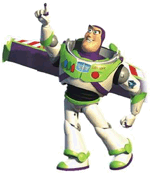
The third Matrix movie is just around the corner from being released in theaters. One of the many attractions of this trilogy is the symbolism represented in the movie, especially in the main character of Neo. Many have written about the process of enlightenment or awareness of Neo, but there is another famous movie figure that reached enlightenment too—Buzz Lightyear.†
In the beginning of the movie Toy Story, Buzz is delusional in believing that he was a real space ranger on a mission to defeat the evil emperor Zurg. Woody, the leader of the toys in Andy’s room, tries without success to convince Buzz that he is just another toy like the rest of them.
There is the obvious symbolism between the new, high-tech, hard plastic, modern way represented by Buzz the space toy, and the soft, plush, old-fashioned way represented by Woody, an old-west sheriff/cowboy. (This theme gets more play in the sequel.) All of the old toys in Andy’s room like Buzz. He is new. He is novel. Andy even seems to play with Buzz more than Woody. In fact, Buzz displaces Woody from the place of honor in the room, the pillow on Andy’s bed. Woody is relegated to the toy box with the other toys.
Unlike Neo in the Matrix movies, Woody is no messiah or Buddha figure. Woody suffers from the sins of pride, jealousy, and selfishness. Eventually, Woody’s sins force him to initiate a sequence of events that would push Buzz down behind the dresser. Behind the dresser is a place of limbo for a toy because Andy and the other toys would not be able to find anything hidden down there. As fortune would have it, Buzz instead gets knocked out of the window. The other toys do not view this event as an accident and decide to banish Woody. Woody is saved at the last moment when Andy reluctantly takes Woody with him on a trip to a restaurant. Buzz hitches a ride on the bumper of the family van and confronts Woody at a gas station. It is during their struggle at the gas station that both of them are left behind.
The rest of the story is about their attempt to get back home. In the trials and tribulations of their adventure, Woody finds repentance for his sins, and Buzz finds enlightenment in discovering his true identity as a toy. Buzz comes to agree with Woody that it is nobler to bring joy and happiness in the play of a child than to be a conquering space hero.
It is worth noting that Buzz would not believe the truth told to him by Woody or the other toys. It was something that he had to discover on his own. (Like in The Matrix when Morpheus said to Neo, “I’m trying to free your mind, but I can only show you the door. You’re the one who has to walk through it.”) Only after accidentally seeing a Buzz Lightyear Space Ranger commercial on T.V., did he begin to have doubts. After the failed attempt at flying, Buzz’s self-identity and world view came literally crashing down around him. He became deeply depressed and despondent. Not even a pep talk by the ever-optimistic and pragmatic Woody helped. Buzz was only able to lift himself out of his depression and accept his new true self when he felt the need to help Woody out of his despair.
In the end, both Woody and Buzz learn that one finds happiness in service to others, and in discovering one’s true self.
† Thanks to Brian, a senior religion teacher, for the original spark for this entry.